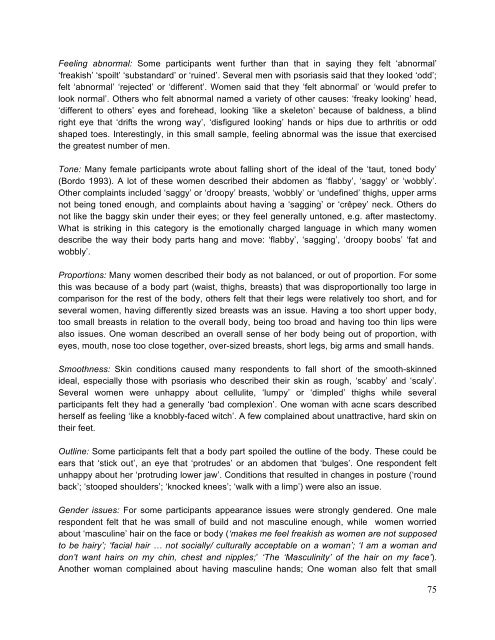Download the report - The Healing Foundation
Download the report - The Healing Foundation
Download the report - The Healing Foundation
You also want an ePaper? Increase the reach of your titles
YUMPU automatically turns print PDFs into web optimized ePapers that Google loves.
Feeling abnormal: Some participants went fur<strong>the</strong>r than that in saying <strong>the</strong>y felt ‘abnormal’<br />
‘freakish’ ‘spoilt’ ‘substandard’ or ‘ruined’. Several men with psoriasis said that <strong>the</strong>y looked ‘odd’;<br />
felt ‘abnormal’ ‘rejected’ or ‘different’. Women said that <strong>the</strong>y ‘felt abnormal’ or ‘would prefer to<br />
look normal’. O<strong>the</strong>rs who felt abnormal named a variety of o<strong>the</strong>r causes: ‘freaky looking’ head,<br />
‘different to o<strong>the</strong>rs’ eyes and forehead, looking ‘like a skeleton’ because of baldness, a blind<br />
right eye that ‘drifts <strong>the</strong> wrong way’, ‘disfigured looking’ hands or hips due to arthritis or odd<br />
shaped toes. Interestingly, in this small sample, feeling abnormal was <strong>the</strong> issue that exercised<br />
<strong>the</strong> greatest number of men.<br />
Tone: Many female participants wrote about falling short of <strong>the</strong> ideal of <strong>the</strong> ‘taut, toned body’<br />
(Bordo 1993). A lot of <strong>the</strong>se women described <strong>the</strong>ir abdomen as ‘flabby’, ‘saggy’ or ‘wobbly’.<br />
O<strong>the</strong>r complaints included ‘saggy’ or ‘droopy’ breasts, ‘wobbly’ or ‘undefined’ thighs, upper arms<br />
not being toned enough, and complaints about having a ‘sagging’ or ‘crêpey’ neck. O<strong>the</strong>rs do<br />
not like <strong>the</strong> baggy skin under <strong>the</strong>ir eyes; or <strong>the</strong>y feel generally untoned, e.g. after mastectomy.<br />
What is striking in this category is <strong>the</strong> emotionally charged language in which many women<br />
describe <strong>the</strong> way <strong>the</strong>ir body parts hang and move: ‘flabby’, ‘sagging’, ‘droopy boobs’ ‘fat and<br />
wobbly’.<br />
Proportions: Many women described <strong>the</strong>ir body as not balanced, or out of proportion. For some<br />
this was because of a body part (waist, thighs, breasts) that was disproportionally too large in<br />
comparison for <strong>the</strong> rest of <strong>the</strong> body, o<strong>the</strong>rs felt that <strong>the</strong>ir legs were relatively too short, and for<br />
several women, having differently sized breasts was an issue. Having a too short upper body,<br />
too small breasts in relation to <strong>the</strong> overall body, being too broad and having too thin lips were<br />
also issues. One woman described an overall sense of her body being out of proportion, with<br />
eyes, mouth, nose too close toge<strong>the</strong>r, over-sized breasts, short legs, big arms and small hands.<br />
Smoothness: Skin conditions caused many respondents to fall short of <strong>the</strong> smooth-skinned<br />
ideal, especially those with psoriasis who described <strong>the</strong>ir skin as rough, ‘scabby’ and ‘scaly’.<br />
Several women were unhappy about cellulite, ‘lumpy’ or ‘dimpled’ thighs while several<br />
participants felt <strong>the</strong>y had a generally ‘bad complexion’. One woman with acne scars described<br />
herself as feeling ‘like a knobbly-faced witch’. A few complained about unattractive, hard skin on<br />
<strong>the</strong>ir feet.<br />
Outline: Some participants felt that a body part spoiled <strong>the</strong> outline of <strong>the</strong> body. <strong>The</strong>se could be<br />
ears that ‘stick out’, an eye that ‘protrudes’ or an abdomen that ‘bulges’. One respondent felt<br />
unhappy about her ‘protruding lower jaw’. Conditions that resulted in changes in posture (‘round<br />
back’; ‘stooped shoulders’; ‘knocked knees’; ‘walk with a limp’) were also an issue.<br />
Gender issues: For some participants appearance issues were strongly gendered. One male<br />
respondent felt that he was small of build and not masculine enough, while women worried<br />
about ‘masculine’ hair on <strong>the</strong> face or body (‘makes me feel freakish as women are not supposed<br />
to be hairy’; ‘facial hair … not socially/ culturally acceptable on a woman’; ‘I am a woman and<br />
don’t want hairs on my chin, chest and nipples;’ ‘<strong>The</strong> ‘Masculinity’ of <strong>the</strong> hair on my face’).<br />
Ano<strong>the</strong>r woman complained about having masculine hands; One woman also felt that small<br />
75


